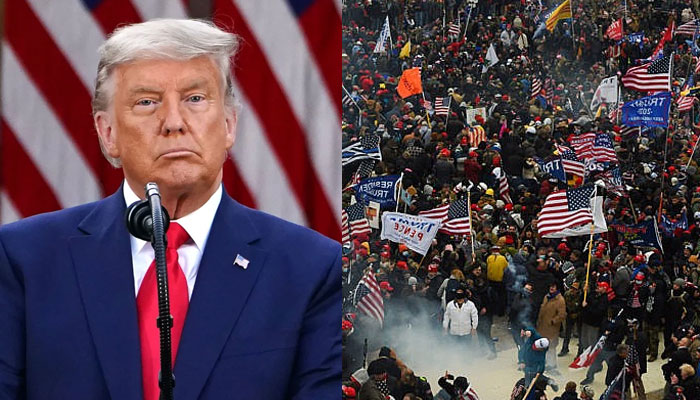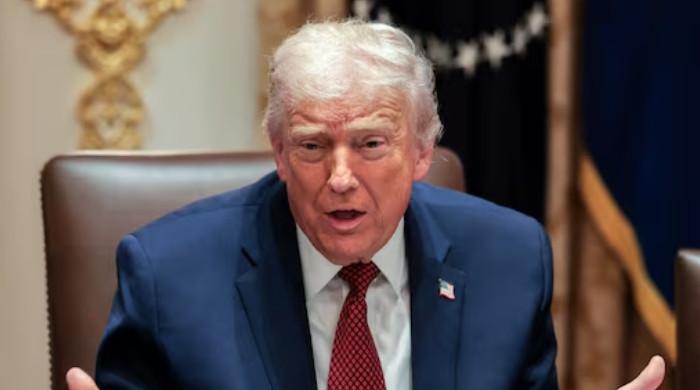Capitol riots case: Is this the end of presidential road for Donald Trump?
Legal experts point to his speech to his supporters, who breached Capitol to thwart certification of Joe Biden's election victory
September 12, 2023

Some of Donald Trump's opponents argue that the former president will be disqualified from the Presidency in light of the events of January 6, 2021, when supporters of former President Donald Trump stormed the Capitol.
They claim that his actions that day amount to supporting an "insurrection," as defined by the 14th Amendment of the US Constitution.
Here, we delve into this legal argument and assess its chances of preventing Trump from becoming the front-runner for the Republican presidential nomination in the November 2024 election.
Path to disqualification
Legal experts contend that Trump's actions on January 6 could disqualify him from the presidency. They point to his impassioned speech to his supporters, who subsequently breached the Capitol in an attempt to thwart the certification of President Joe Biden's election victory.
This argument hinges on Section 3 of the 14th Amendment, a post-Civil War provision that bars government officials who have "engaged in insurrection or rebellion" from holding office.
Citizens for Responsibility and Ethics in Washington, an advocacy group, initiated a lawsuit in Colorado on September 6.
This lawsuit seeks to prevent the state's top election official from including Trump on the ballot in the 2024 election, citing Section 3. This move could spark a legal battle that spans all 50 states, raising a largely untested legal question with significant implications for federal office eligibility.
Convictions and precedents
It's crucial to note that Trump has not been convicted of inciting insurrection. In his second impeachment, the House of Representatives charged him with inciting an insurrection on January 6, but Senate Republicans narrowly acquitted him. Trump currently faces four criminal indictments, two of which relate to his unfounded claims of election fraud, not insurrection or rebellion.
Some legal experts caution that efforts to disqualify Trump based on these allegations might set a concerning precedent. Such actions could empower state election officials to unilaterally disqualify candidates based on their interpretations of "insurrection or rebellion," potentially violating candidates' rights to due process and equal protection under the 14th Amendment.
Mechanics of disqualification
Section 3 of the 14th Amendment lacks a clear enforcement mechanism. Some legal scholars argue that it would necessitate an act of Congress to be implemented.
Others contend that state election officials are obligated to apply it when evaluating candidates for the ballot and can be compelled to do so through court orders.
For this approach to succeed, proponents would need to persuade officials in Republican-leaning states to prevent Trump from appearing on the ballot, denying him the 270 Electoral College votes required for victory.
This endeavour would almost certainly trigger legal challenges from Republicans.
Historical context and feasibility
Section 3 was invoked to disqualify several individuals from holding office in the aftermath of the US Civil War (1861-1865) but has since remained dormant.
However, in September 2022, the same advocacy group that sought to keep Trump off the Colorado ballot convinced a New Mexico judge to oust a county commissioner due to his involvement in the January 6 insurrection.
The feasibility of this effort remains questionable. It would necessitate persuading or compelling election officials in states governed by Trump's Republican allies to keep him off the ballot, potentially culminating in an extensive legal battle.
Ultimately, the US Supreme Court, which currently leans conservative with three Trump appointees among the justices, could decide the outcome.
Recent use of 14th Amendment
In a separate context, during a standoff with House Republicans over the nation's $31.4 trillion debt ceiling, President Joe Biden briefly considered employing Section 4 of the 14th Amendment to unilaterally raise the debt limit. However, he did not pursue this course of action, as its success was uncertain and raised legal questions.









